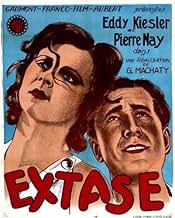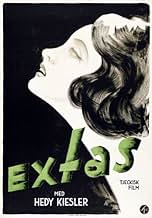Eva has just got married to an older gentleman. She leaves him, and one day, she meets a young man, and they fall in love. Fate brings the husband together with the young lover that has take... Read allEva has just got married to an older gentleman. She leaves him, and one day, she meets a young man, and they fall in love. Fate brings the husband together with the young lover that has taken Eva from him.Eva has just got married to an older gentleman. She leaves him, and one day, she meets a young man, and they fall in love. Fate brings the husband together with the young lover that has taken Eva from him.
- Awards
- 2 wins & 1 nomination total
Hedy Lamarr
- Eva Hermann
- (as Hedy Kiesler)
Emil Jerman
- Eva's husband
- (voice)
Antonín Kubový
- Landarbeiter
- (as Antonin Kibový)
Bedrich Vrbský
- Eva's father
- (voice)
Jirina Stepnicková
- Eva
- (voice)
Ladislav Bohác
- Adam
- (uncredited)
Comedian Harmonists
- Themselves
- (uncredited)
Kani Kipçak
- Dr. Brady
- (uncredited)
Karel Macha-Kuca
- Der Rechtsanwalt
- (uncredited)
Jirina Steimarová
- Typist
- (uncredited)
Featured reviews
10wndlz
This film could have been a silent movie; it certainly has the feel of one. I was extremely, extremely lucky to see this very rare version of this film. Extase, is a 'symphony of love', and transcends all language versions. French, which is the ultimate romantic language, seems quite suitable for this very sensual and lyrical version.A young Hedy Lamarr lights up the screen, in this film which, in a way is almost like a sex fantasy; but definitely far from being pornographic.Tech qualities may have been a little crude; but that does not detract from the magical spell this film exudes.Many lovers of early cinema, would absolutely adore this film.
This is one that sent church and censors in disarray when it made its way to America, no doubt for the divorced woman who runs fully naked through the woods. The things people would be so uptight about, so tame to us now. But it introduced Lamarr to Hollywood.
A young woman then who yearns to be open to sense things, live life, but she's stifled by thankless marriage. The whole plot is typical, what they were calling kammerspiel in Germany, about the twists and turns of love, until the moral denouement that inevitably parts lovers.
But instead of narrowing down to a room and stage, it opens up sense to things, we have a poetry of evocative skies, nature, reflections, glances of the eye that conjoin a wider world. In many respects it might as well have been a silent, dialogue is scant.
And it does more than paint in fact, it paints the state of mind that gives rise to the pulls that create narrative. You'll see this in the famous scene mentioned above, where capricious horse nature sends her out to meet her mate. Or the marvelous scene later that night of anxiously being unsure if she wants to go to his house, rendered with wind through an empty house and dark rolling skies above.
It's simple in contrasts and goes down rather easy but dressed and timed to resonate. The ex husband languishing in an empty room while the lovers are greeted with music in the tavern next door. Love isn't allowed last say however as if that would be too upsetting for the social norm.
But something else is, more poignant eventually.
The ending shows a working site with tools strewn about, deserted at morning. But does life stop in its tracks because a woman left? We now see workers file in and joyously go to work, the work of doing is resumed with song, the ground transformed, a faucet turned on and waters of life pour freely. It's the most vital scene in the film, emulating the Soviet filmmakers but so good it's worthy of being in Zemlya.
A young woman then who yearns to be open to sense things, live life, but she's stifled by thankless marriage. The whole plot is typical, what they were calling kammerspiel in Germany, about the twists and turns of love, until the moral denouement that inevitably parts lovers.
But instead of narrowing down to a room and stage, it opens up sense to things, we have a poetry of evocative skies, nature, reflections, glances of the eye that conjoin a wider world. In many respects it might as well have been a silent, dialogue is scant.
And it does more than paint in fact, it paints the state of mind that gives rise to the pulls that create narrative. You'll see this in the famous scene mentioned above, where capricious horse nature sends her out to meet her mate. Or the marvelous scene later that night of anxiously being unsure if she wants to go to his house, rendered with wind through an empty house and dark rolling skies above.
It's simple in contrasts and goes down rather easy but dressed and timed to resonate. The ex husband languishing in an empty room while the lovers are greeted with music in the tavern next door. Love isn't allowed last say however as if that would be too upsetting for the social norm.
But something else is, more poignant eventually.
The ending shows a working site with tools strewn about, deserted at morning. But does life stop in its tracks because a woman left? We now see workers file in and joyously go to work, the work of doing is resumed with song, the ground transformed, a faucet turned on and waters of life pour freely. It's the most vital scene in the film, emulating the Soviet filmmakers but so good it's worthy of being in Zemlya.
Dripping with symbolism and filled with marvelous cinematography, Extase is so much more than the erotic drama we've all come to expect. This is almost a silent film, with what dialogue there is in German, and highly simplified German at that. Perhaps the filmmakers intended the film to reach the widest possible European audience, as anyone with even a little high school level Deutsch can easily dispense with the subtitles. The story is of little importance anyway, with the film succeeding on a cinematic level, not a narrative one. Symbols of fecundity and the power of nature overwhelm the human characters--there are even scenes where flowers obscure the face of supposed star Hedy Lamarr--and there are moments here that will remind viewers of the works of Dreyer, Vertov, and Riefenstahl. If the film has any message to convey, I think it's a political one: bourgeois man is timid and impotent; working class man is a happy, productive creature; and woman is the creator, destined to be unfulfilled until she has borne a child. This blend of Soviet socialist realism and National Socialist dogma doesn't overwhelm the film by any means--it's a beauty to watch from beginning to end--but it does place it in a very distinct artistic era. And, oh yeah, Hedy does get her kit off.
Eva (Hedy Lamarr) has just got married with an older man and in the honeymoon, she realizes that her husband does not desire her. Her disappointment with the marriage and the privation of love, makes Eva returning to her father's home in a farm, leaving her husband. One afternoon, while bathing in a lake, her horse escapes with her clothes and an young worker retrieves and gives them back to Eva. They fall in love for each other and become lovers. Later, her husband misses her and tries to have Eva back home. Eva refuses, and fortune leads the trio to the same place, ending the affair in a tragic way.
I have just watched "Extase" for the first time, and the first remark I have is relative to the horrible quality of the VHS released in Brazil by the Brazilian distributor Video Network: the movie has only 75 minutes running time, and it seems that it was used different reels of film. There are some parts totally damaged, and other parts very damaged. Therefore, the beauty of the images in not achieved by the Brazilian viewer, if he has a chance to find this rare VHS in a rental or for sale. The film is practically a silent movie, the story is very dated and has only a few lines. Consequently, the characters are badly developed. However, this movie is also very daring, with the exposure of Hedy Lamarr beautiful breasts and naked fat body for the present standards of beauty. Another fantastic point is the poetic and metaphoric used of flowers, symbolizing the intercourse between Eva and her lover. The way the director conducts the scenes to show the needs and privation of Eva is very clear. The non-conclusive end is also very unusual for a 1933 movie. I liked this movie, but I hope one day have a chance to see a 87 minutes restored version. My vote is eight.
Title (Brazil): "Êxtase" ("Ecstasy")
I have just watched "Extase" for the first time, and the first remark I have is relative to the horrible quality of the VHS released in Brazil by the Brazilian distributor Video Network: the movie has only 75 minutes running time, and it seems that it was used different reels of film. There are some parts totally damaged, and other parts very damaged. Therefore, the beauty of the images in not achieved by the Brazilian viewer, if he has a chance to find this rare VHS in a rental or for sale. The film is practically a silent movie, the story is very dated and has only a few lines. Consequently, the characters are badly developed. However, this movie is also very daring, with the exposure of Hedy Lamarr beautiful breasts and naked fat body for the present standards of beauty. Another fantastic point is the poetic and metaphoric used of flowers, symbolizing the intercourse between Eva and her lover. The way the director conducts the scenes to show the needs and privation of Eva is very clear. The non-conclusive end is also very unusual for a 1933 movie. I liked this movie, but I hope one day have a chance to see a 87 minutes restored version. My vote is eight.
Title (Brazil): "Êxtase" ("Ecstasy")
This early German talkie stars the gorgeous Hedy Lamarr as a bored hausfrau and is notorious for not only showing her in her birthday suit but also in the throes of passion. The film was banned in the US! For that reason alone, one should watch it. Lamarr is truly beautiful and offers a strong performance as the woman who falls for the security of an older man (and marries him) only to become restless and subsequently enthralled with a younger, more exciting lover.
Did you know
- TriviaFirst surviving non-pornographic film to depict a woman having an orgasm.
- GoofsIn the beginning when Emil is in the bedroom, a closeup of the photo on the bedside table is shown to have writing on it. On the second closeup, when Emil is carefully rearranging his keys and other items, there is no writing.
- Quotes
Eva Hermann: Tell him... no. Don't tell him anything.
- Alternate versionsTo get the film around the more conservative German censors, an alternate version of Hedy Lamarr's nude bathing scenes was shot in which she was partially obscured by strategically-placed bushes.
- ConnectionsEdited into Histoire(s) du cinéma: Fatale beauté (1994)
- How long is Ecstasy?Powered by Alexa
Details
- Runtime1 hour 22 minutes
- Color
- Sound mix
- Aspect ratio
- 1.19 : 1
Contribute to this page
Suggest an edit or add missing content































